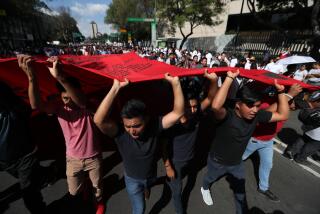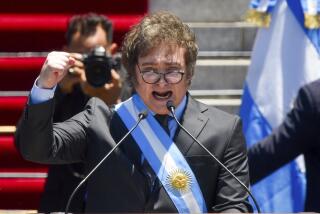Economy Aside, Castro Sticks to His Socialist Guns : Cuba: He addresses nation on the 38th anniversary of attack that was a prelude to 1959 revolution.
- Share via
HAVANA — President Fidel Castro said Friday night that Cuba is accepting foreign investment to help overcome a severe economic crisis and preserve the social welfare gains of his Communist revolution.
“Our beaches are as valuable as petroleum . . . but we don’t have the resources to exploit them ourselves,” Castro said in a speech to the nation. “We must take practical steps to achieve our place in the world economy, our economic independence. If not, the sovereignty and independence of this country that has cost us so much will be lost.”
Cuba has allowed majority foreign ownership in its fast-growing tourist industry for more than a year and at least $800 million in investment has come in, principally from Spain. But, on the eve of a tourist invasion for next month’s Pan American Games, this was Castro’s first effort in a major speech to justify the openness of his socialist regime to private capital.
The Cuban leader spoke at a formal ceremony to tens of thousands of people in Matanzas, 60 miles east of here, on the 38th anniversary of the abortive assault by him and fellow revolutionaries on the Moncada barracks in eastern Cuba. The attack was the prelude to the 1959 revolution that toppled right-wing dictator Fulgencio Batista and brought Castro to power.
South African anti-apartheid leader Nelson Mandela, who arrived Thursday for a three-day visit to Cuba, was guest of honor at the ceremony, where he sat alongside former Nicaraguan President Daniel Ortega. Castro decorated Mandela with the Order of Jose Marti, named for Cuba’s independence hero, and called him “one of the most extraordinary symbols of this era.”
Much of Castro’s 2-hour, 40-minute address was a defiant, eloquent defense of his decision to cling to socialism and Marxist-Leninist principles following the collapse of such regimes in Eastern Europe and the growing disruption of Cuba’s ties to the Soviet Union, its principal benefactor. Those changes have inflicted the most severe consumer shortages on Cuba since Castro’s takeover.
“Capitalism,” he declared nonetheless, “has neither the capacity, nor the morality, nor the ethics to solve the problems of poverty.” A return to pre-1959 Cuban-style capitalism, he added, would bring back “all the old vices of that society--illiteracy, prostitution, racial discrimination, children without schools. . . . So why even talk of such garbage?”
At another point, he said the name of Cuba’s Karl Marx University would not be changed--a swipe at Soviet President Mikhail S. Gorbachev’s proposal to de-emphasize Marxist-Leninist thought in the Soviet Communist Party.
“The ideological battle has to be waged with more strength than ever,” Castro declared, “because imperialism does not seem to have any enemy in the world except for this little Cuba.”
Castro has been trumpeting a willingness to stand alone for the last two years. But, at the same time, his regime has been making quiet adjustments in the Cuban economy, trying to promote self-sufficiency in food and seek new sources of economic support. Besides foreign investment, his speech mentioned another example of change--the growing legion of 70,000 small private farmers, which he termed a “school” with some potential lessons about individual enterprise.
He also said that Cuba is eager to draw its economy closer to Latin America--a message he took last week to Guadalajara, Mexico, for his first summit meeting with other regional heads of state.
Boasting of his participation in that meeting as a step toward ending Cuba’s political isolation, Castro said that integration with other Latin countries would bring private investment in industries that Cuba cannot develop on its own.
“We can conceive of integration with Latin America without renouncing socialism,” he said.
More to Read
Sign up for Essential California
The most important California stories and recommendations in your inbox every morning.
You may occasionally receive promotional content from the Los Angeles Times.













